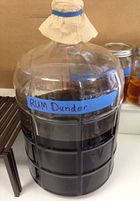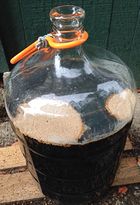Dunder: Difference between revisions
Uncle Jesse (talk | contribs) (Creating wanted page) |
m (→External Links: Added BA's "Dunder Disposal" link) |
||
| (10 intermediate revisions by 2 users not shown) | |||
| Line 1: | Line 1: | ||
The liquid left in a [[still]] after a [[run]] of [[rum]] is completed. The dunder is used in subsequent [[ | [[file:dunder_without_infection.jpg|thumb|140px|right|Dunder Without Infection]] | ||
[[file:dunder_with_infection.jpg|thumb|140px|right|Dunder With Infection]] | |||
The liquid left in a [[still]] after a [[run]] of [[rum]] is completed, also know as stillage. The dunder is used in subsequent [[mash]]es to aid in [[fermentation]] and add flavor to the [[distillate]]. Dunder can be used fresh or left open to the environment ("Seasoned") to be contaminated with yeast and bacteria. Dunder is put into a open container (the famed [[Dunder Pit]]) to encourage bacterial infection. These bacteria create [https://en.wikipedia.org/wiki/Carboxylic_acid Carboxylic acid] that is then converted into an [[Ester]]. Dunder pits must be maintain by the removal and addition of fresh dunder or some materials in the dunder pit will decompose into ammonia. | |||
Typically for Rum 10-25% of the wash liquid is Dunder. Some papers show usage up to 50%. Per Arroyo, Seasoned Dunder should be around 4% of total volume, and included after most of the primary fermentation has been completed. | |||
A Dunder pit is not a [[Muck Pit]]. Dunder is related to [[Barm]], [[Backset]], and [[Sour Mash]]. | |||
For Seasoned/Infected Dunder one must understand the safety of its use: [[Dunder Pit Safety]] | |||
==HD Posts== | |||
*[http://homedistiller.org/forum/viewtopic.php?f=39&t=66998 Dunder pit infections] | |||
*[http://homedistiller.org/forum/viewtopic.php?f=3&t=67450 Does a dunder pit create esters or a feedstock for them?] | |||
*[http://homedistiller.org/forum/viewtopic.php?f=40&t=67603 When to add aged dunder?] | |||
==External Links== | |||
*[https://en.wikipedia.org/wiki/Dunder Dunder at Wikipedia] | |||
*[https://www.bostonapothecary.com/muck-hole-not-dunder-pit/ Boston Apothecary:“Muck Hole” Not “Dunder Pit”] | |||
*[https://www.bostonapothecary.com/wp-content/uploads/2019/09/JAST-1945-DUNDER-DISPOSAL.pdf Boston Apothecary:PDF of article "Methods of Dunder Disposal"] | |||
*[http://cocktailwonk.com/2016/03/days-of-dunder-setting-the-record-straight-on-jamaican-rums-mystery-ingredient.html Cocktail Wonk: Days of Dunder, setting the record straight] | |||
*[http://artisanspiritmag.com/the-deal-with-dunder/ Artisan Spirit Magazine: The Deal with Dunder] | |||
[[Category:Distillation]] | [[Category:Distillation]] | ||
[[Category:Fermentation]] | [[Category:Fermentation]] | ||
[[Category:Glossary]] | [[Category:Glossary]] | ||
Latest revision as of 03:30, 23 September 2019
The liquid left in a still after a run of rum is completed, also know as stillage. The dunder is used in subsequent mashes to aid in fermentation and add flavor to the distillate. Dunder can be used fresh or left open to the environment ("Seasoned") to be contaminated with yeast and bacteria. Dunder is put into a open container (the famed Dunder Pit) to encourage bacterial infection. These bacteria create Carboxylic acid that is then converted into an Ester. Dunder pits must be maintain by the removal and addition of fresh dunder or some materials in the dunder pit will decompose into ammonia.
Typically for Rum 10-25% of the wash liquid is Dunder. Some papers show usage up to 50%. Per Arroyo, Seasoned Dunder should be around 4% of total volume, and included after most of the primary fermentation has been completed.
A Dunder pit is not a Muck Pit. Dunder is related to Barm, Backset, and Sour Mash.
For Seasoned/Infected Dunder one must understand the safety of its use: Dunder Pit Safety
HD Posts
- Dunder pit infections
- Does a dunder pit create esters or a feedstock for them?
- When to add aged dunder?

